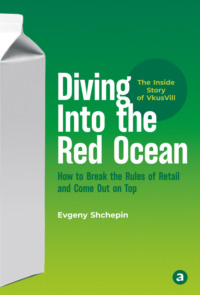Kitabı oku: «Diving Into the Red Ocean. How to Break the Rules of Retail and Come Out on Top», sayfa 2
Bir şeyler ters gitti, lütfen daha sonra tekrar deneyin
4,8
4 puan
₺588,64
Türler ve etiketler
Yaş sınırı:
12+Litres'teki yayın tarihi:
05 nisan 2022Çeviri tarihi:
2022Yazıldığı tarih:
2021Hacim:
224 s. 57 illüstrasyonISBN:
9785961477498Tercüman:
Yayıncı:
Telif hakkı:
Альпина Диджитал